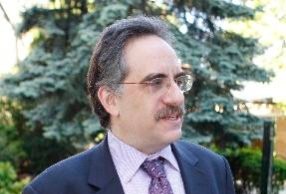Jeremy Kasman, Director of Operations, Federation of Jewish Men’s Clubs, NYC, U.S. Mr. Kasman’s answers that are posted here represent his own personal views and not hose of his employer.
In your opinion, what importance, if any, does the existence of a Jewish state have to you personally and to Jewish people in general?
“Israel is our family ‘home’ even when we have not yet been there. Its being there makes us proud of who we are. Where ever we as Jews are in the world Israel connects us all.”
Do you feel committed in some way to defend the future existence of Israel?
“Yes.”
Do you affiliate yourself with a specific confessional division in Judaism? What is your view regarding the dominance of the Orthodox division in Israel religious establishment?
“I belong to a Reconstructionist synagogue. I work for the Conservative Movement. My wife belongs to a Reform synagogue. We will both attend services at Chabad. In our city, the Rabbis from four ‘streams’ Reform, Conservative, Orthodox and Reconstructionist study together regularly. Our communities work, pray and study together. I have been to an egalitarian Orthodox Minyan.
“The ‘monopoly’ that a specific set of Orthodox Rabbis seem to hold over religious matters is alien to me. To me it is important to respect the beliefs and practices of other Jews. My Chabad Rabbi in a Tisha B’av sermon spoke about the Menorah in the Temple in Jerusalem. He said that the arms of the Menorah stood for the different branches of Judaism, that at the time Jerusalem fell and the Temple was destroyed, the different branches represented by these arms did not respect each other. If we fail to learn from that lesson he warned Jerusalem could fall again.”
Do you feel morally responsible for Israel’s actions (such as its management of the Israeli-Palestinian conflict)?
“Yes.”
In your opinion, what is the main thing Israelis fail to understand about the reality of being Jewish outside of Israel?
“That there are so many different ways to practice Judaism in a religious way. The Israelis that I have met in non-Orthodox congregations seem astounded that it is possible to practice Judaism that way.”
How would you describe Israel’s policy (formally and in practice) regarding its relationship with the Diaspora?
“We are a global people of many ethnicities, nationalities, cultures, colors, and cuisines, because we do love to eat :), and I am not sure that Israel’s policy sees this as a strength. I think it is a strength. It is good thing to be able to travel halfway round the world and find a place pray in Mumbai.”
In your opinion, does Israel have an obligation to defend and help Jewish communities in need?
“Help always. Jews always help – we feed the hungry and remember the widow and the orphan – and not just our own.”
Have you ever been to Israel? if you have, can you summarize your impression from the Israeli reality?
“Yes, twice. I felt like I was coming home to family, even though I did not speak or read Hebrew. Everyone was warm and friendly. I felt safe.”
Can you tell us a bit about the Jewish community in your hometown? Is it organized? Are there community activities?
“My ‘city’ is a great place to be Jewish. We have five synagogues within the walking distance of each other. Four of the Rabbis from four “streams” Reform, Conservative, Orthodox and Reconstructionist study together each week. Our five synagogues work, pray and study together. My first visit to Israel was a “Five Synagogue” trip of all lay people, no clergy.
“I feel comfortable and welcome walking into any congregation to attend services or an event. There are other synagogues and minyans nearby, as well as Kosher restaurants and markets.”

